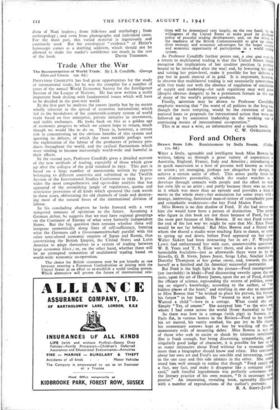Ford and Others
Drawn from Life. Reminiscences by Stella Bowen. (Cana 12S. 6d.)
WHAT a lively, agreeable and intelligent book Miss Bowen ha written, taking us through a great variety of experiences a Australia, England, France, Italy and America ; introducing a in quick succession to a host of persons well known as writen or artists ; yet managing, perhaps not altogether by design, to achieve a certain unity of effect. This arises partly from her own distinctive personality, which the reader watches as a develops through contacts with people and the effort to make her own life as an artist ; and partly because there was an even in it which was more than an episode and provides a kind el motiv to the whole story—her association for some years with I strange, interesting, fantastical man-of-letters of remarkable pose and remarkable weaknesses—the late Ford Madox Ford.
Miss Bowen is no dim shadow of Ford. If she had never ma him she would have been a person of distinction. The people who figure in this book are not there because of Ford, but fa the most part because of Miss Bowen. If we met Ford towards the end of the last war we might be sure that Mr. Ezra Pound would be not far behind. But Miss Bowen and a friend with whom she shared a studio were teaching Ezra to dance, or rathe to spring up and down, before Ford appeared on her scene. Walter Sickert had been instructing her in art ; P. Wyndham Lewis had embarrassed her with curt, unanswerable questions; W. B. Yeats and T. S. Eliot wen. there, and also a number d formidable Socialists—just as afterwards there were to be the Sitwells, G. B. Stern, James Joyce, Serge Lifar, Sinclair Lewis, Dorothy Thompson et hoc genus omne, and, towards the end herself as a finished and (in America) successful portraitist.
But Ford is the high light in the picture—Ford incongruous!! (yet inevitably) in khaki—Ford discoursing sweetly upon the ma flute, upon the art of Henry James, upon the art of Ford, denying the efficacy of science, expounding the secrets of politics, reveal- ing an expert's knowledge, according to the author, of "& hidden places of the heart," and strolling in one day to announa to Miss Bowen that " he wished to place his person, his fortune, his future" in her hands. He "wanted to start a new homy Wanted a child "—love in a cottage. What could she sal? Simply " Yes, of course." She accepted him " as the wise ml! whom I had come across the world (from-Australia) to filla So there was love in a cottage (with pigs) in Sussex, in Paris flat, in various homes in the Riviera—Ford to be tended his art nursed, his vanity soothed, his gay joy in life shared his momentary sorrows kept at bay by warding off the les momentary evils of mounting debts. Miss Bowen is not :s 0 of those who seek to excite or shock by intimate revelation," She is frank enough, but being discerning, sympathetic, and singularly good judge of character, it is possible for her to !el us many intimacies about Ford without for a moment tellil more than a biographer should know and relate. Her comma° about her own art and Ford's are sensible and interesting, mod in the one case and this side idolatry in the other. She undel. stood him well enough to realise that though " Ford could a fact, any fact, and make it disappear like a conjurer with card," such fanciful legerdemain was perfectly consistent 06 the literary practice of his own maxim, " It is necessary to It precise." An interesting, revealing book, agreeably illustrani with a number of reproductions of the author's portraits.
R. A. Scorn-JAmEs


























 Previous page
Previous page